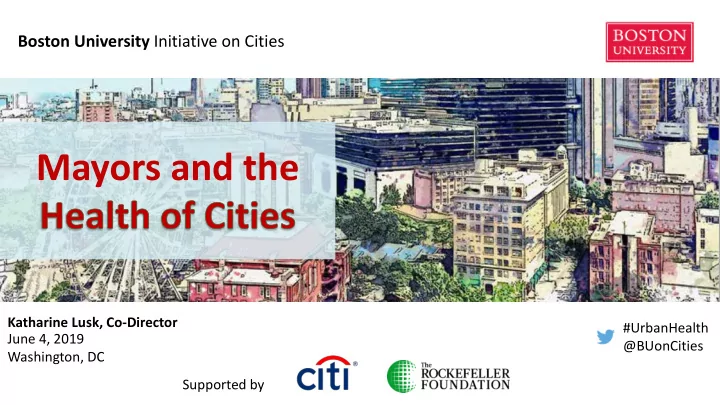

Boston University Initiative on Cities Mayors and the Katharine Lusk, Co-Director #UrbanHealth June 4, 2019 @BUonCities Washington, DC Supported by
Methodology Analyses based on several datasets and sources: • 2018 Menino Survey of Mayors : nationally representative survey of 110 American mayors leading cities over 75,000; Gauge of perceptions and attitudes • City Health Dashboard 500 Cities • Supplemental information from federal sources
Greatest Health Challenge Facing the City? Greatest Challenge: 25% Obesity, Diabetes 24% Opioids/Addiction 14% Access to Care 15% reference mental health 27% cite specific groups: children or homeless Source: 2018 Menino Survey of Mayors, Mental health based on any mention
Mayors Using the Language of Public Health “[Our greatest health challenge is] poverty.” “…the trauma associated with violence and ACEs impacting social determinants of health.” “Sedentary lifestyles directly and indirectly contribute to chronic health problems, including the leading cause of mortality in the US.” “You can look at the issues people are dealing with (diabetes, cancer, STDs), but at the core is access to health care.”
How Healthy Are the Cities Citing Obesity? Source: 2018 Menino Survey of Mayors, City Health Dashboard
Perceptions of Constituent Accountability What explains responses? Transportation, Police, Inspectional Services & Housing departments common While only ~20% of cities have a municipal health agency However, health agency type not correlated with perceived accountability Source: 2018 Menino Survey of Mayors
What Else Explains Perceptions of Accountability? Percentage of Mayors Responding Very or Somewhat Accountable Highly significant differences in Democrats Republicans perception by Gun violence 72% 23% party affiliation and gender. Hunger/Malnourishment 55% 32% Prevalence was Women Men highly significant only once: opioid Hunger/Malnourishment 60% 42% overdose deaths. Mental Health 45% 26% Source: 2018 Menino Survey of Mayors
Key Findings: • Many mayors talk knowledgably about health, including social determinants • Mayors report obesity, addiction and access to care as key health challenges • Common challenges shared by heterogeneous groups of cities • Perceived accountability differs: traffic accidents, gun violence, lead and other toxicants top list; obesity at bottom • Accountability may be attributed to resources, although not dedicated health resources • Some perceptions differ significantly based on mayoral political affiliation or gender
Full Report available at: hank yo you ! Tha surveyofmayors.com Katharine Lusk, Co-Director Special thanks to co-authors Luisa Godinez Puig & Prof. Monica Wang, plus Profs. Max Palmer, Katherine Levine Einstein and David Glick; & Stacy Fox BU Initiative on Cities ioc@bu.edu www.bu.edu/ioc 617-358-8080 @BUonCities @Kathlusk
Appendix: Municipal Health Authorities Authority Type Percentage in 2018 Menino Percentage in the US Survey Sample (N=110) (N=2533 Health Departments) Municipal 18% 20% County 75% 69% Regional 7% 8% Source for National Percentage: National Association of County and City Health Officials. “2016 National Profile of Local Health Departments.” 2016, http://nacchoprofilestudy.org/reports-publications/
Recommend
More recommend